Overpatterning
On habituation, synthetic experience, + social overlays // Re-enchanting the world
This is a companion piece to III. Fallout
The Map Precedes the Territory
Have you ever found a song that you absolutely love and listen to constantly? And then for some reason, maybe after 30 listens, maybe after 100, it just stops hitting you the same way? You might even start to skip it when it comes up in your playlist.
What is it exactly that changes? Why do things “get old?”
I think part of it’s about efficiency. We get exposed to something enough, we start to think we know what’s there, and our brains stop spending as much effort to really investigate it. It starts to harden conceptually - becomes familiar.
You want this to some degree. The world would be overwhelming and incoherent if we didn’t do this at all, and our conceptual understanding enables us to do important things. It opens experience up to deeper degrees of possibility and meaning. But too much of it, and there are downsides. We stop really experiencing things for what they are - interacting with representations in our minds rather than the world itself. Things start to get old.
I am not the first to notice this –
If we start to examine the general laws of perception, we see that as perception becomes habitual, it becomes automatic … if one remembers the sensations of holding a pen or of speaking in a foreign language for the first time and compares that with his feeling at performing the action for the ten thousandth time, he will agree with us […]
By this "algebraic" method of thought we apprehend objects only as shapes with imprecise extensions; we do not see them in their entirety but rather recognize them by their main characteristics. We see the object as though it were enveloped in a sack. We know what it is by its configuration, but we see only its silhouette […]
Victor Shklovsky, Art as Technique (1917)
For most this process only tends in one direction as time goes on - towards more abstraction, more hardening of ideas, more habituation, and less reality.
I think it’s part of the yearning and nostalgia people have for their childhood - it may have been the last time things felt real and vivid, before the world was replaced by concepts and they could still see it in its fullness.
It seems to me that this problem is getting worse.
Too Many Ideas
Part of it I think is the sheer amount of information we are exposed to -
Concepts and simplifying abstractions are necessary to help us navigate the information chaos of our worlds. But every time we scroll our feeds, we’re undergoing a kind of training: our ideas are hardening, and the amount of the world we are able to see is being reduced.
Take for example this finding -
[R]ecent research suggests that people browsing social media tend to experience “normative dissociation” in which they become less aware and less able to process information, to such an extent that they often can’t recall what they just read.
Gurwinder, The Intellectual Obesity Crisis
What I suspect is actually happening here is this kind of conceptual hardening. After a lot of time online, my sense is people can only take in the words they’re reading enough to map them to an existing set of higher-level, simplifying concepts, and stop being able to process and really register the individual characteristics. They start to see only the silhouette and outward configuration before matching it to the nearest representation in their minds, no longer really able to take in any more.
In this way our digital feeds are like habituation engines - machines for callousing our perception.
But information overload is only one side of the coin. The other is the ideas themselves.
Synthetic Experience
Growing up, it seemed even to me like kids who were younger and younger were getting into riskier trouble. I went to a pretty tame boarding school, but in my 9th grade year, one of my friends was already smoking weed pretty regularly, and one night he snuck mushrooms in for him and another of my friends to try as they watched Fear and Loathing in Las Vegas. (I trip sat.)
This sort of thing may seem more commonplace now, and this isn’t nearly the most egregious example, but I wonder if kids weren’t a bit milder and more innocent a few generations ago?
I attribute at least part of the change to a feedback loop between media and culture. My friends and I had grown up with media that put these things forward as interesting and desirable activities for older teens who we took as role models and wanted to emulate. But then our generation, beginning these things at much younger ages, defined the next iteration of culture that new media took as influence - and the cycle intensified.
There’s a habituation with media that amplifies this loop as well. Because they lack the fullness of real experience, the things we see on screen are reduced to concepts quickly and easily, and they get old and unexciting fast. It’s why novelty rules media, and why the people writing our shows and movies go to further and further extremes to keep an audience. But, importantly, it’s not just that this stuff becomes boring on TV while watching: it also becomes boring IRL.12
I call this problem synthetic experience: we can develop such detailed expectations and structures for our experience through indirect means that we come to fit reality into these preconceptions, rather than experiencing it for what it actually is.
We’ve always had things that do this to some extent - old folktales and stories, plays and novels. But only in the last two or three generations have we had something as complex and immersive as a modern movie or television show, and we spend more time taking them in than we ever have.3
Think about how odd this really is:
On its face this sort of thing may seem pretty benign, but I think it’s actually a huge part of the difficulty people have with dating. There is just so much conditioning and preconception around it all, layered in since childhood, that it gets in the way of having any kind of genuine, open experience with another person that could actually lead to a real connection.4
And this process touches literally everything. We get models of how we’re supposed to socialize, argue, eat, dress, grieve, have a midlife crisis, find success and meaning. I’m not saying people can’t tell the difference between fiction and reality, or that we are endlessly suggestible and don’t have our own ideas. But we absorb at least some of this; and we end up subtly fitting our experience to it, rather than the other way around.
But what we pick up from movies is just a drop in the bucket compared to what we get from our peers.
Social Overlays
In the early 2010s there was this emerging folk-pop style that came to be known (and derided) as Stomp-Clap-Hey. You’ve heard it before - acoustic and repurposed instruments, community feeling, swelling crescendos, and, yes, stomps claps and heys. It played into a general cultural yearning for tradition, community, sincerity, optimism, and coming back down to earth in reaction to a broader culture more defined by superficial excess, ironic detachment, and growing atomization. It was short lived, but for a brief moment, it was everywhere.
And then it died quickly.
Almost overnight, all of this stuff that had so quickly ascended to total cultural dominance became embarrassing, and nobody would touch it with a ten-foot pole.
Coining the name to describe it - Stomp Clap Hey - was the kiss of death. Once there’s a way for everyone to collectively refer to something, the broader group can then coordinate against anyone participating in it, pushing those who took part to distance themselves and concentrating the shame on anyone remaining. It’s a vicious cycle; and wherever it gains a bit of traction, it tends to go to completion.5 Few will now admit that they ever liked anything in a wide neighborhood of this aesthetic that had once reliably taken the top spots in pop music charts and influenced most cultural trends.
It happens often. Thinking back, the broad disdain for the band Nickelback was probably the first instance of this that I encountered personally. But some more recent examples - would you mention liking The Office on your dating profile? Or the book Sapiens? Imagine Dragons? These things were extremely popular and then almost overnight became intensely shameful to the point where people might feel second hand embarrassment if you even mentioned them.
Here’s the thing: I think a lot of this stuff is actually pretty good. I like apothecarycore and trinkets. Ho Hey is a good song.6
But many of you reading are probably cringing when I say that. I actually found it hard to type without this reflex to caveat these things and show wait no I have good taste, I am trying to make a subtler point but of course I am aware of why these things are bad. And that exact thing is the problem, these layers of internalized shame and ego that we are all absorbing.7
And I’m not saying that there’s no basis at all to any of the criticisms of this stuff. But what I find is that these swings are often largely just capitulations to fickle tides of group opinion - allowing a thing to become completely defined by its least charitable connotations and examples, a hard and reductive inference made real by social fiat.8
It’s destructive, and increasingly it comes for everything:
We shouldn’t allow our worlds to be defined in the terms of niche status hypercompetition and toxic group dynamics. It’s nicer - better in every way - to be able to see things in their entirety; to see what’s good about them, rather than allowing them to be reduced to their social overlays.
But it’s genuinely hard. It makes you vulnerable to real reputational damage to go against the group like this, and it’s pushed on us at every turn.
Every time I open twitter, or instagram, or reddit, I am flooded with it:
Inevitably some of it slips through. Haven’t you ever caved to this kind of consensus in a way you’ve later recognized as unfair and regretted?
It’s all just extremely mean. You can say they’re just jokes (they’re not), and maybe some of it is calling out real stuff at the margin that’s a bit annoying. But I think people just have no sense of the collateral damage being done and how much it outweighs any other consideration. Once something becomes a consensus node for the broader group to shame, the dynamics are so overpowered that nobody will touch it, and everything near it gets destroyed.
It’s what’s made our culture so toxic. This stuff just has too much power.
And it’s deeply related to everything we are seeing:
Can you remember how things used to be?
We really did seem to be lighter and more open as a people not that long ago. I notice it often when I meet people from other countries who were not socialized in the same ways that most of us have been - this striking lack of self-consciousness and judgement, and a charitable, good natured openness and generosity that is obvious the second you meet them.
And it makes sense when we are absorbing so much of this stuff - to come to see ourselves and each other and the rest of the world in such uncharitable and reductive terms, and the influence this has on every aspect of our being.
How can we return?
Seeing the Sky
If the engine whistles, let it whistle till it is hoarse for its pains. If the bell rings, why should we run? We will consider what kind of music they are like. Let us settle ourselves, and work and wedge our feet downward through the mud and slush of opinion, and prejudice, and tradition, and delusion, and appearance, that alluvion which covers the globe, through Paris and London, through New York and Boston and Concord, through church and state, through poetry and philosophy and religion, till we come to a hard bottom and rocks in place, which can call reality, and say, “This is.”
Henry David Thoreau, Walden (1854)
It’s hard to overstate how far the effects go.
I met a girl at a wedding some time ago, I forget her name, but she worked at Google and it was around the time of the controversy with James Damore. I guess most of the conversations she had turned to that subject, because when she said where she worked she was a little bit braced as if expecting me to bring it up. But I actually wasn’t online at all at the time, and didn’t even know who he was when she finally asked me if I’d heard about all of it. It was incredible - I have never seen a person light up more or be more interested in talking in my life.
It’s just a small example, but have you ever experienced this? How nice it is to relate with people who don’t already have so many ideas that they can actually take in new ones?9
I think it’s what connection actually consists of - this ability to have genuine openness with another, to actually see them rather than your own ideas and ego. It is one of the greatest kindnesses we can give. But I think we’re absorbing so much that it’s becoming harder and harder to do.
I find now I am almost never really open to anything. When I am interacting with someone, I am always catching myself reflexively mapping them or what they are sharing with me to some reductive concept I’ve picked up. It’s not truly mine, and I resist it, but it doesn’t matter - it’s already precluded connection.
And it touches everything -
And so life is reckoned as nothing. Habitualization devours work, clothes, furniture, one's wife, and the fear of war. "If the whole complex lives of many people go on unconsciously, then such lives are as if they had never been."
It’s just the total disenchantment of life. And at the far end, it is to be locked away in your own mind, separated from those around you, and ultimately separated from God.10
But I think it’s possible to go back.
A few places I would start:
It’s obvious we need to change our relationship with social media. I have more ideas about this, but I think a few key steps are to limit scrolling in favor of more intentional use, and to not let it become the background condition to your life by checking it in every interstitial moment. Everyone struggles with this, including me, but I liked this idea and had pretty good success with it in the time I was following it.
Culture should mostly be local. Grace and fairness do not scale, but outrage and cruelty do.
True art is a weapon against everything I am describing,11 and we need to help create better conditions for it’s production.
People absorb this stuff much more quickly when reputational stakes and group pressure are high and they don’t have much confidence in themselves or space to consider what they really think. Giving middle and high schoolers unfettered internet access is a genuine disaster for their well-being and personal development (as well as for the project of civilization), and something needs to be done about it.
Meditation.12 It is the inverse motion of habituation, a way to resensitize yourself to the fullness of reality, and I don’t think it’s entirely coincidental that it’s popularity has grown so much in recent years. I don’t currently have a practice, but I was happier and a better person when I did.
But much more to come in IV - Depatterning.
Habituation by its very nature obliterates information like variation in context. When concepts replace reality, subtle differences in the latter no longer matter - they’re not taken in. And so everything resembling the thing also gets replaced, and it can take a lot of effort to make it all real again.
This can also happen with IRL experience depending on how you engage with it. E.g. being ‘ran through’ - it means too much experience that is insensitive and mediated by concepts to the point where it becomes very hard to resensitize.
A hyperconnected culture takes this up a few notches. When communication is instantaneous, many-to-many, etc, ideas build on one another much more rapidly, and there is increasing pressure to absorb them without enough time to really check them against reality. Steeped in this sort of culture from childhood, it can be very hard to find your way back to ground.
Justin Murphy had a similar take which I have drawn some inspiration from.
If you doubt this, see if you can go back in your mind to 2010 and try to imagine what it was like to hear it for the first time. Try to see under the social connotations that have now polluted it - I think you’ll find that there is a very different thing there if you can soften to the ways it makes you feel shame.
Coolness (cringe/shame) is demonic and one of the main ways Satan influences this planet.
One indication of the total capriciousness of social opinion is that often these things emerge ten or twenty years later to become cool again, if not even sooner.
I think this is part of why being around kids can be so incredibly renewing.
I think this actually is much of what nihilism and a sense of meaninglessness is about - concepts replacing things and the way we fall out of touch with reality.
The purpose of art is to impart the sensation of things as they are perceived and not as they are known. The technique of art is to make objects "unfamiliar," to make forms difficult - Art as Technique
I am borrowing the section title from David Chapman, who, to paraphrase, says that he meditates to see the sky, rather than ‘the sky.’

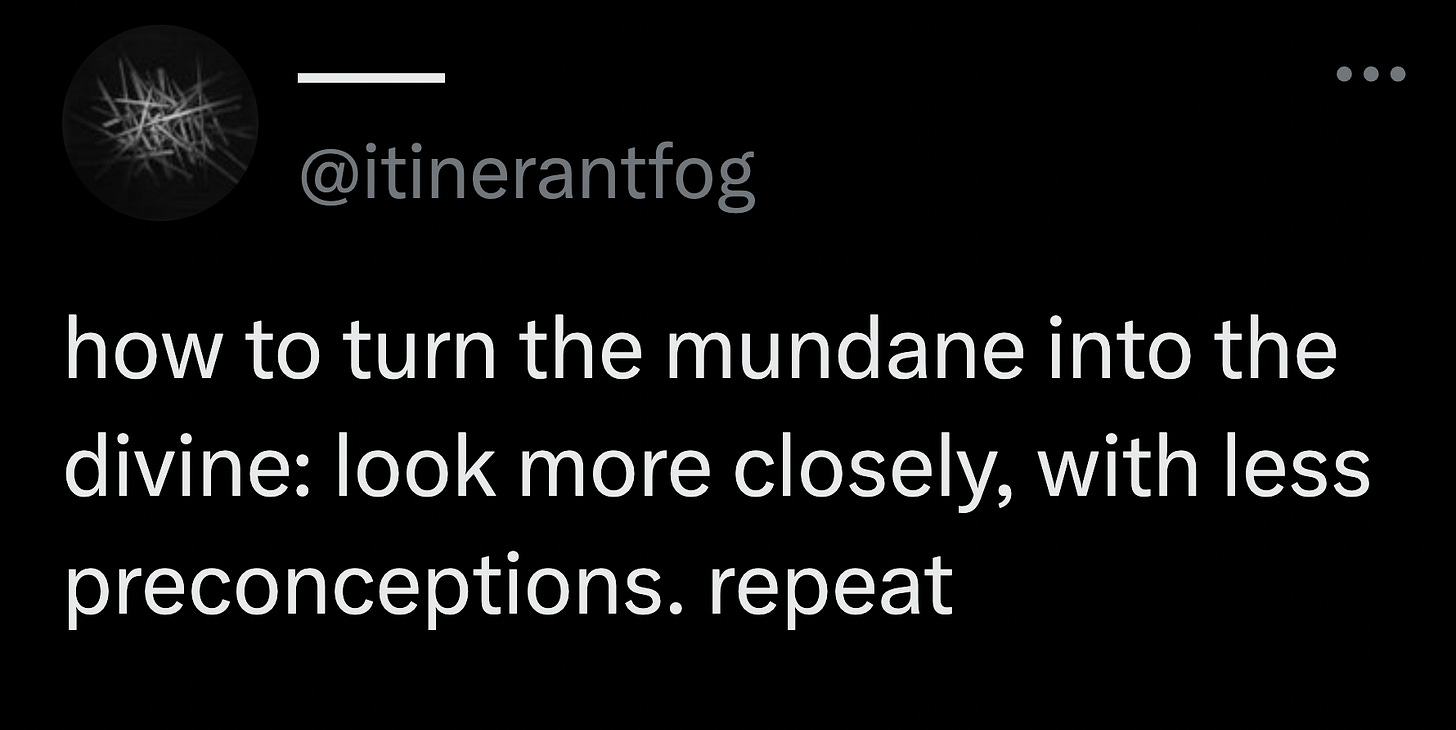
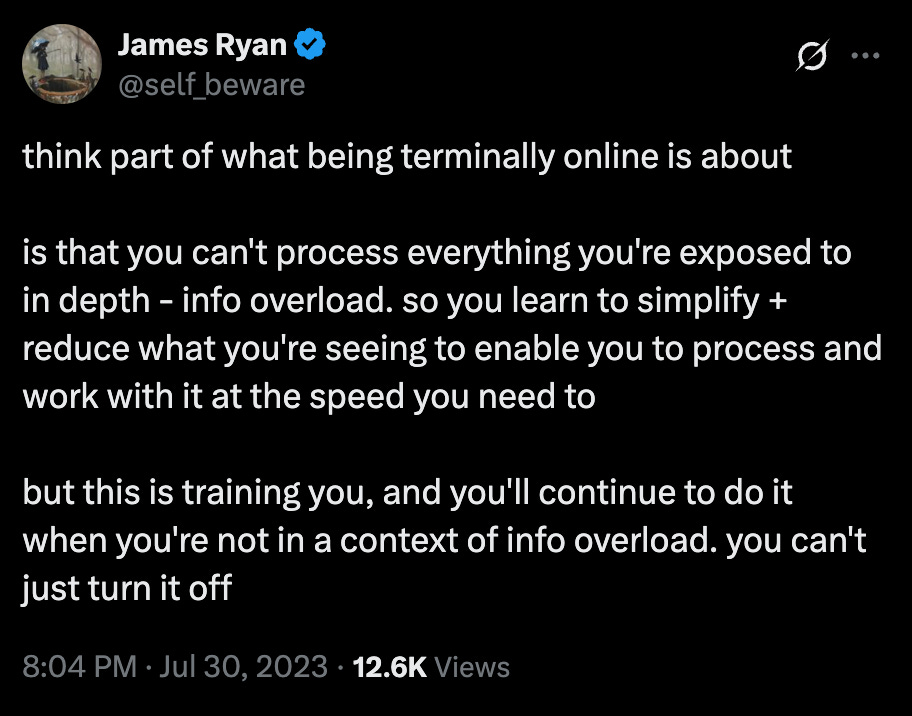
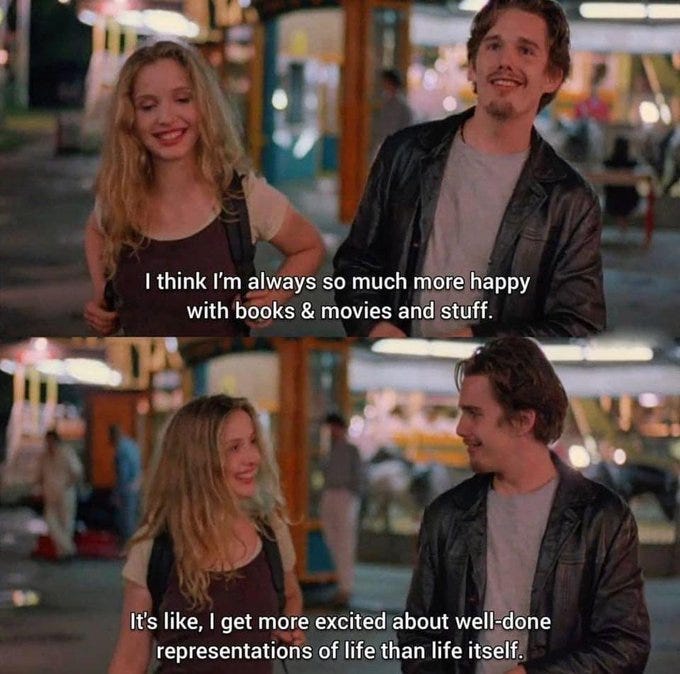
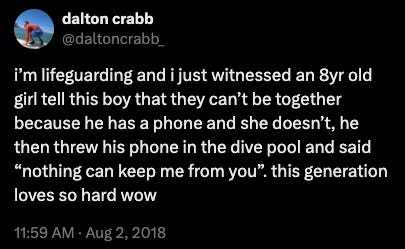

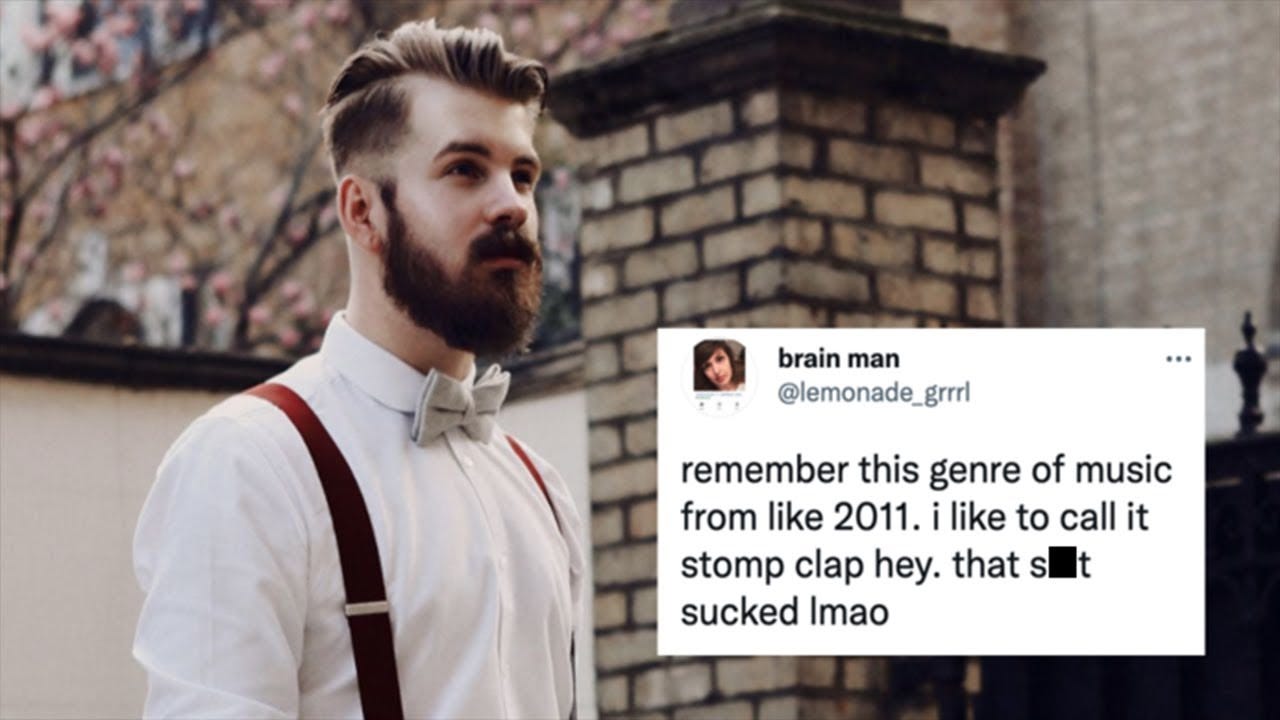
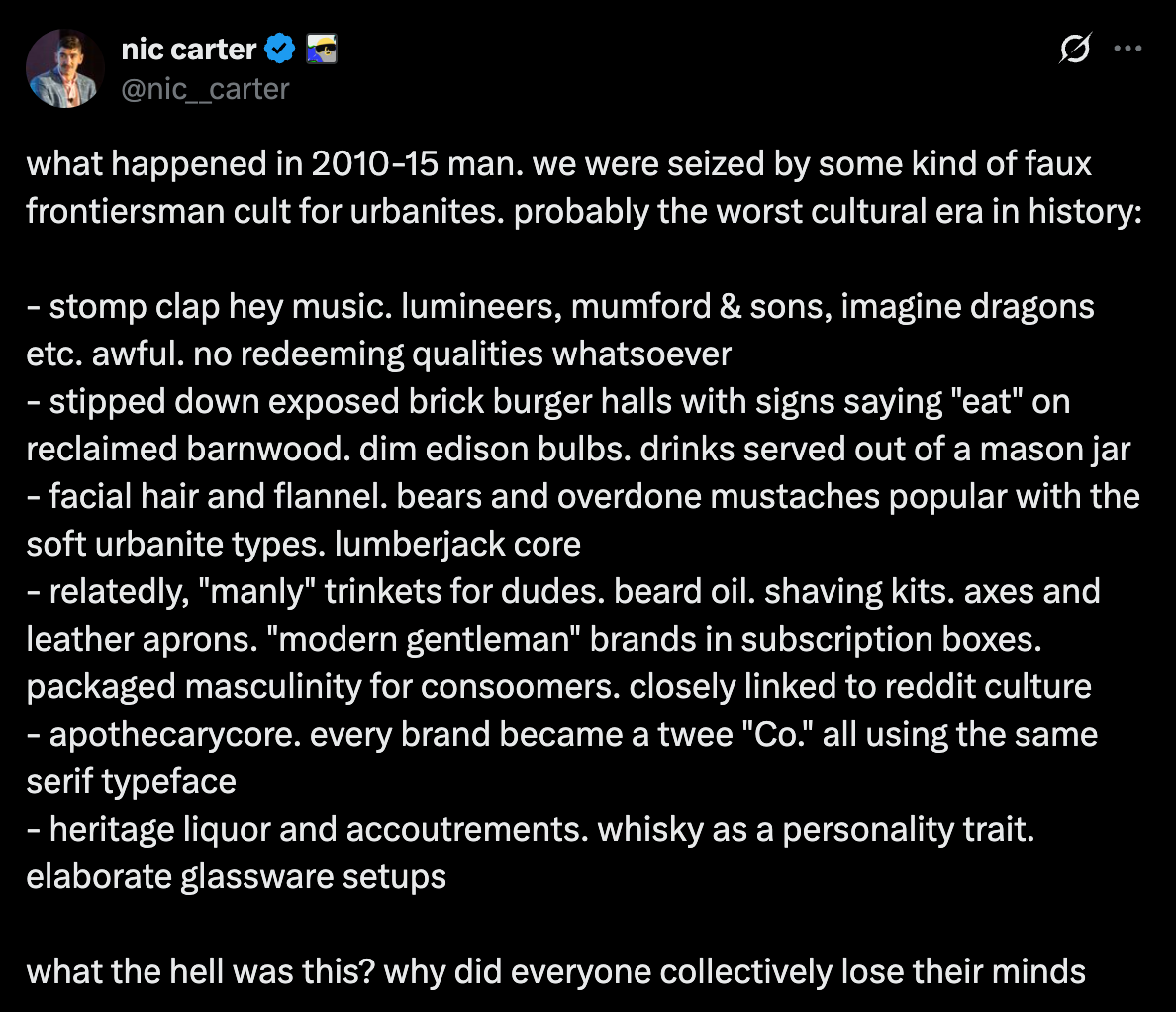



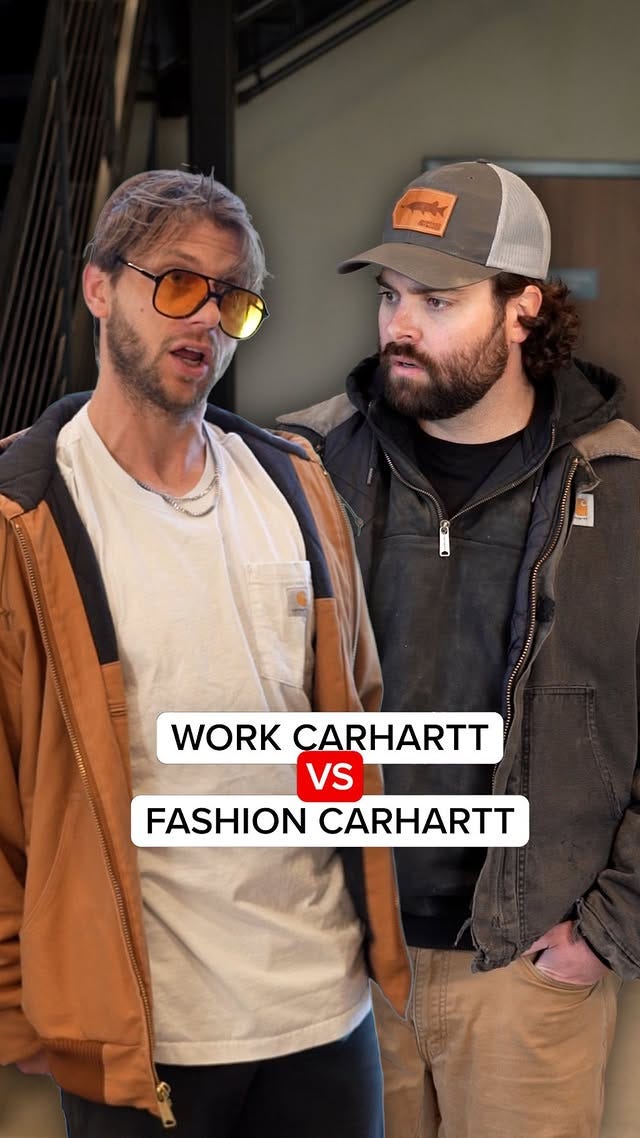

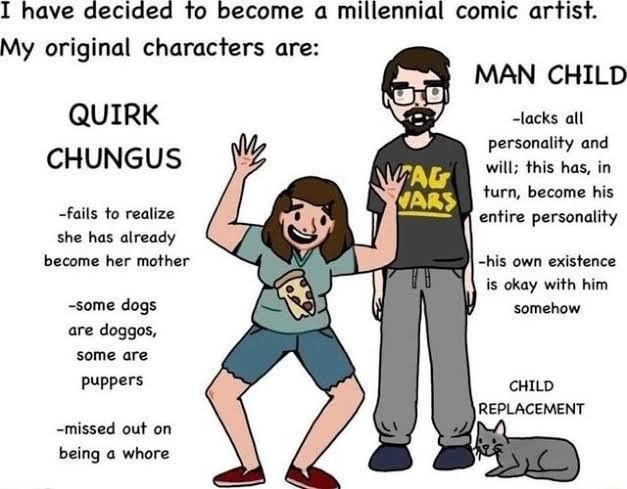
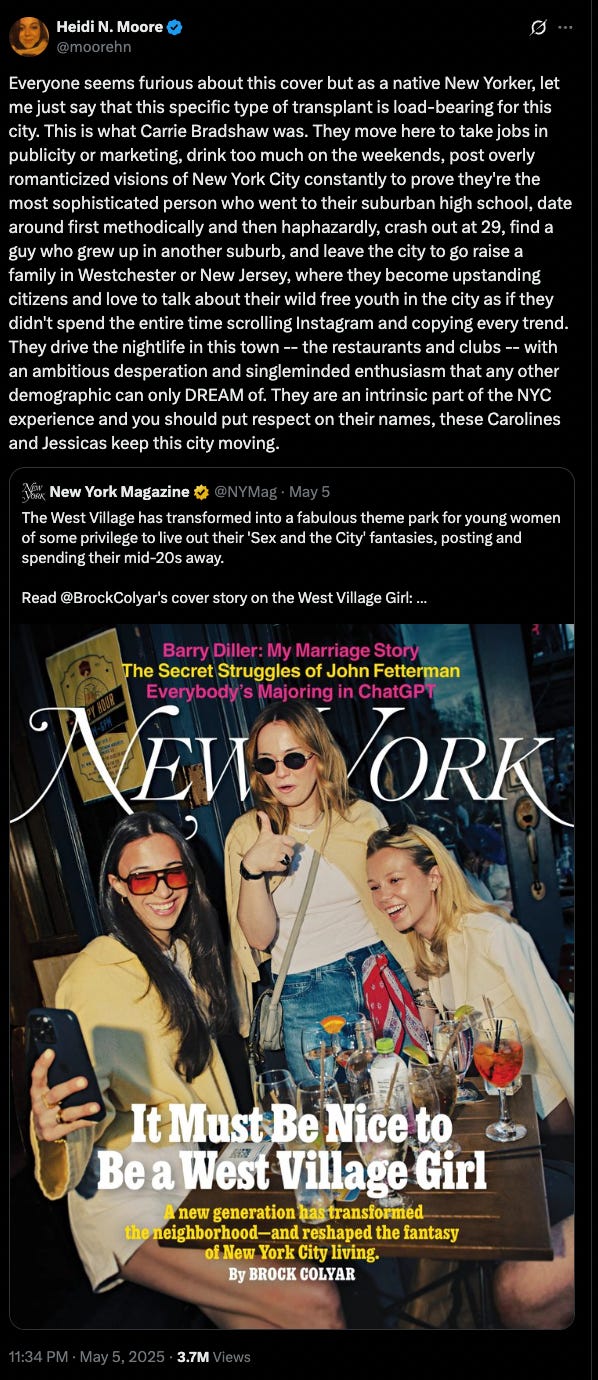
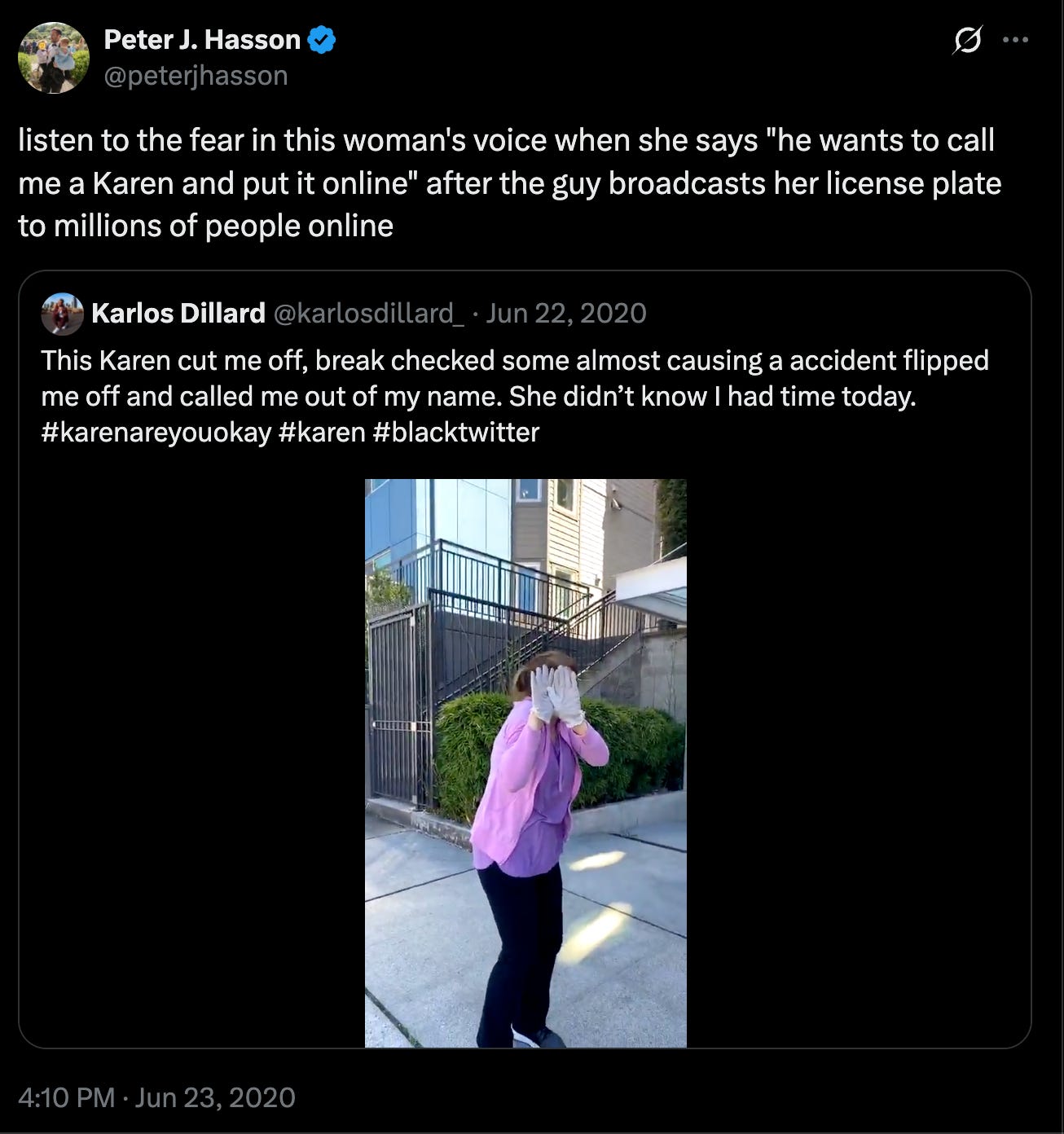
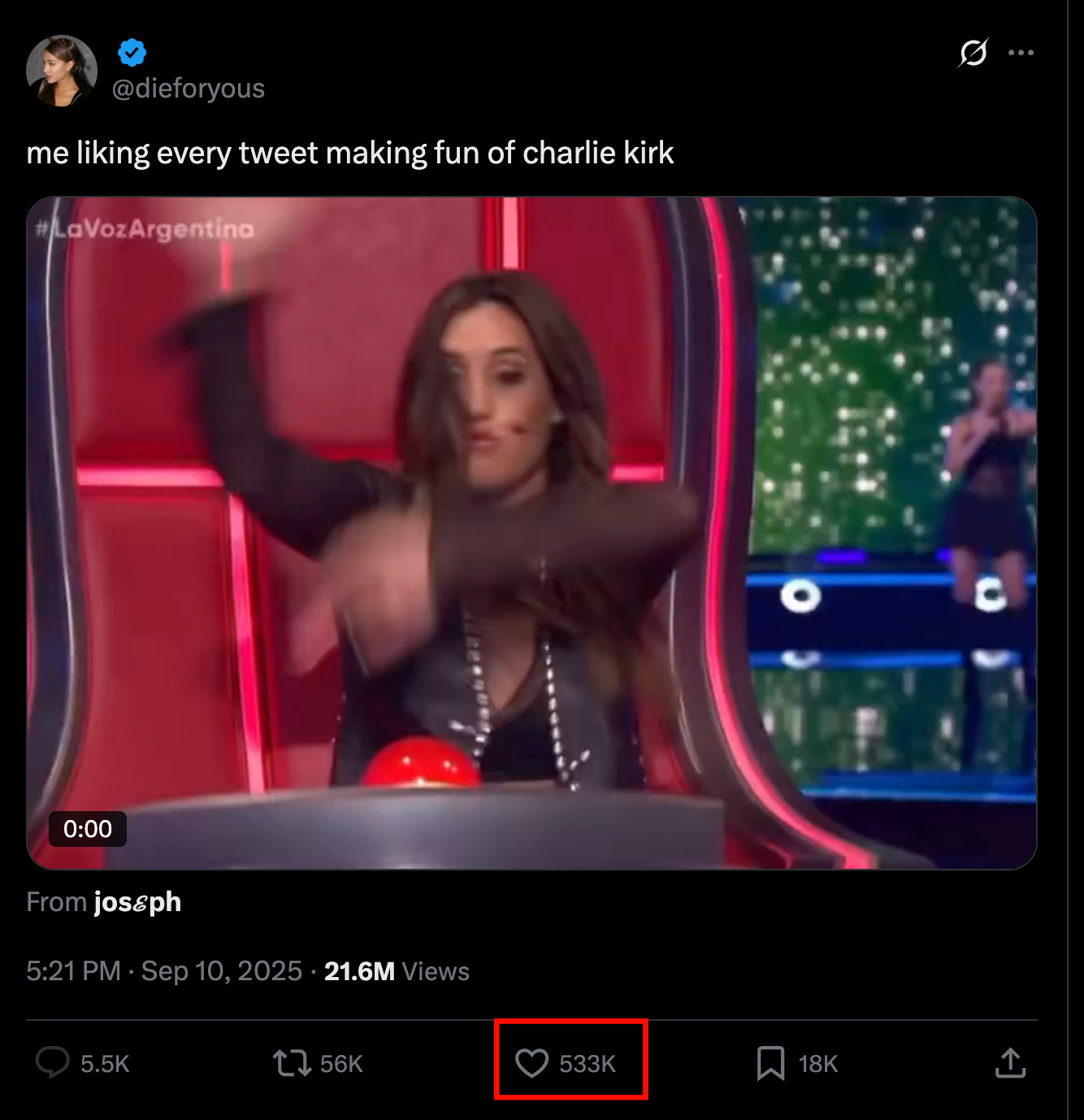
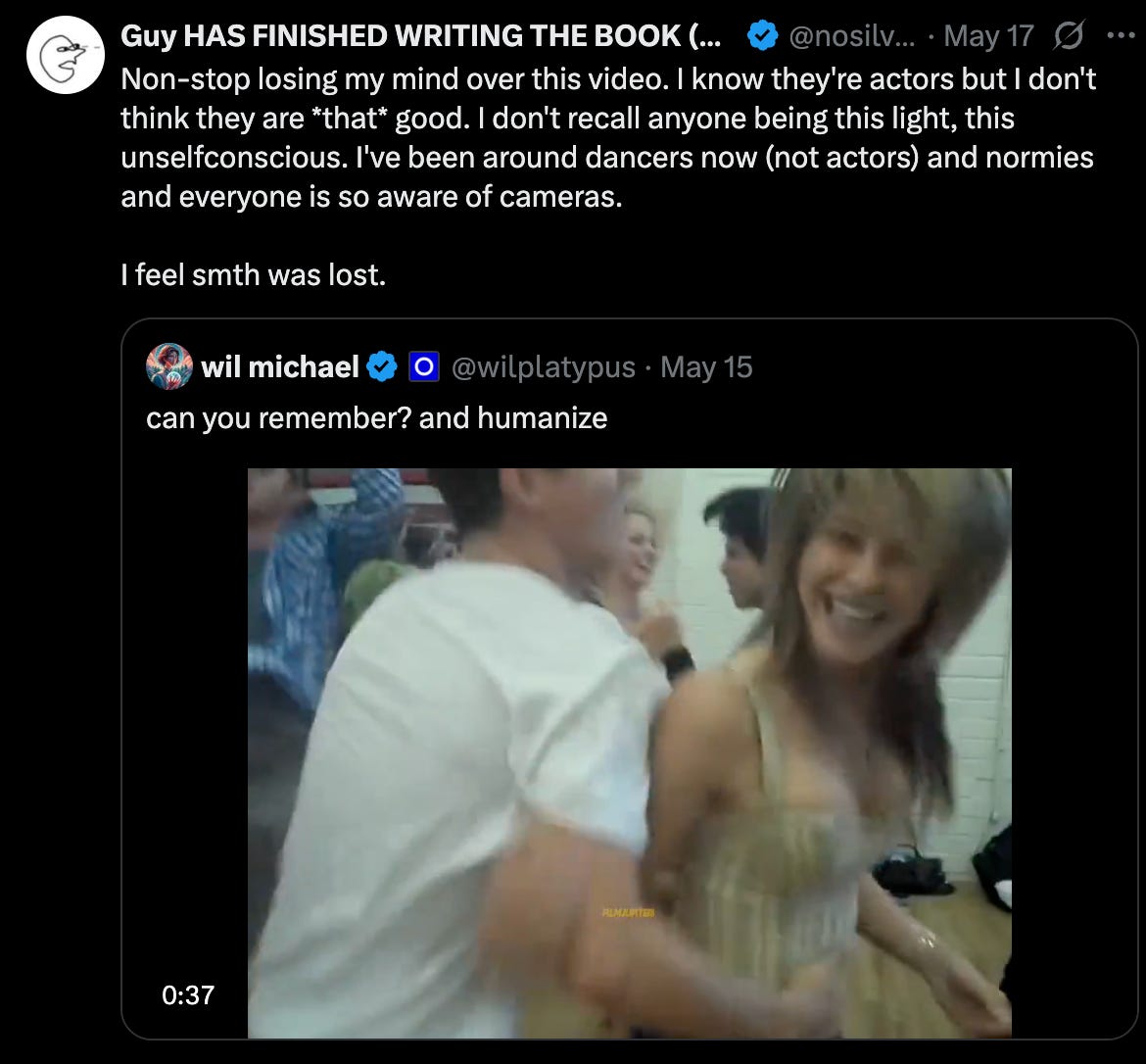
I came of age during the 80s but was a huge consumer of books and movies and magazines, and even from that I realized how much of my life was cut off from authentic experience because of my preconceived notions of how things were supposed to go. Looking back it's clear that there were a lot of connections I didn't make because they didn't look like what I thought they should, and that is a tragedy.
As I read this essay, I was nodding along and thinking, good god, it has never been more important to get people to meditate. Was glad to see it cited as a remedy at the end.
I don't know where in the world you are, but you're welcome to come sit with us at Angel City Zen Center in LA anytime. You can also do it via Zoom.
I thought this was very insightful. Two additional ideas to add to your list of what to do:
1. Find something meaningful to do that pulls time away from social media.
2. Spend your time with other people who aren't constantly on social media. I was struck by the universalist language in this piece: "everyone struggles with this", "few will now admit", "we’re absorbing so much". These do not apply to me or most people I know, but we are not on social media so you don't see us. I don't care if you like apothecary stuff!
Starting a family checks both of these boxes.
Also 3. Get sufficiently disgusted by mainstream cultural pettiness that you leave social media more or less for good.